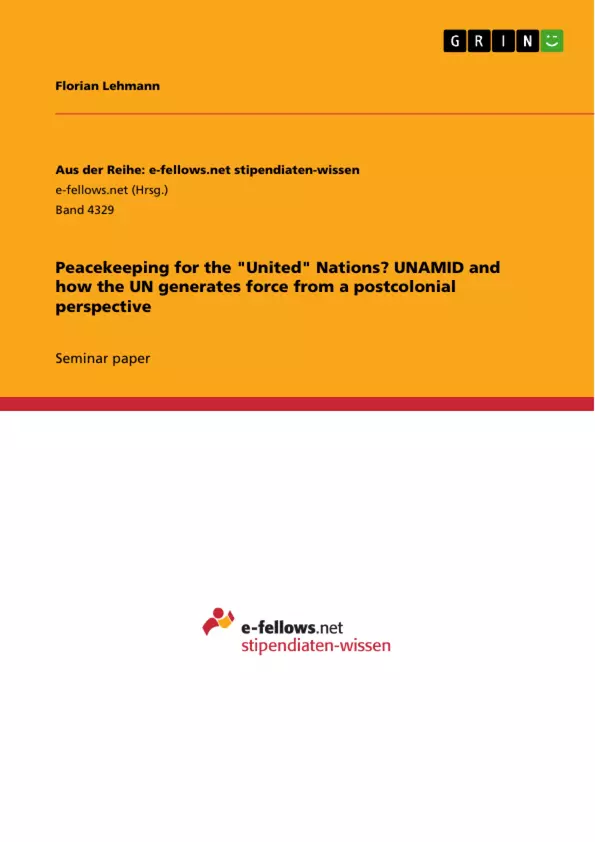The text explores the dynamics of United Nations (UN) peacekeeping missions, particularly focusing on the overrepresentation of military personnel from the Global South (Africa, Asia, Latin America) compared to their lower financial contributions. It delves into concerns raised by countries from the Global South regarding potential Western-centric peace enforcement doctrines being imposed on the UN, potentially leading to the exploitation of troops from developing nations as 'cannon fodder.' It poses the question of whether UN peacekeeping missions are subject to structural racism, viewed from a postcolonial perspective.
The text is divided into three main parts. Firstly, it introduces postcolonial theory and its perspective on power relations, contrasting it with other theories in International Relations. Secondly, it explains the general organization and conduct of UN peacekeeping missions, highlighting key actors involved. Lastly, it examines power relations within UN peacekeeping operations, utilizing the United Nations–African Union Mission in Darfur (UNAMID) as a case study to explore how postcolonial structures might contribute to the overrepresentation of Troop Contributing Countries (TCCs) from the Global South.
Ultimately, the text aims to deconstruct power dynamics within UN peacekeeping missions and analyze their implications, specifically addressing the impact of postcolonial structures on the disproportionate presence of Troop Contributing Countries from the Global South in missions like UNAMID. The conclusion summarizes the findings derived from applying postcolonial theory to the case study, seeking to answer the research question posed throughout the text.
Inhaltsverzeichnis (Table of Contents)
- Introduction
- Postcolonial theory
- Theoretical framework
- Power in postcolonial theory
- How does the UN generate force?
- Who decides what?
- Security Council
- Secretary General
- Troop Contributing Countries
- UNSAS
- UNPCRS
- Who decides what?
- (Postcolonial) power relations in UN peacekeeping
- Troop contributions and the Global South
- Case study UNAMID
- Nigerias role
- Rwanda's role
- Egypt's role
- Summary
- Conclusion
Zielsetzung und Themenschwerpunkte (Objectives and Key Themes)
The purpose of this paper is to deconstruct power relations within the United Nations (UN) peacekeeping framework from a postcolonial perspective. The main focus will be on the overrepresentation of troop-contributing countries from the Global South in UN missions, particularly the United Nations-African Union Mission in Darfur (UNAMID). By analyzing the case study of UNAMID, the paper aims to answer the research question: What impact do postcolonial structures have on the overrepresentation of Troop Contributing Countries in the Global South in the UN peacekeeping mission UNAMID?
- Postcolonial theory and its understanding of power dynamics in international relations.
- The role of Western states and their influence on UN peacekeeping operations.
- The overrepresentation of troop-contributing countries from the Global South in UN peacekeeping missions.
- The specific case of UNAMID and its power relations within the context of postcolonial theory.
- The implications of postcolonial structures on the use of force in UN peacekeeping operations.
Zusammenfassung der Kapitel (Chapter Summaries)
The first chapter introduces the context and significance of the study, highlighting the imbalance of power in UN peacekeeping operations, particularly the overrepresentation of troop contributions from the Global South. The second chapter provides a theoretical framework based on postcolonial theory, discussing its critical perspectives on power relations, particularly within the context of North-South relations. This chapter examines the differences between postcolonial theory and other theoretical approaches in International Relations (IR), such as realism and neo-realism.
The third chapter explains the dynamics of UN peacekeeping operations, focusing on the decision-making processes, the roles of different actors like the Security Council, the Secretary-General, and the Troop Contributing Countries (TCCs). This chapter outlines the mechanisms by which the UN generates force, highlighting the involvement of diverse entities.
The fourth chapter explores the power relations within UN peacekeeping operations through a case study of UNAMID, examining the troop contributions from the Global South, including the specific roles of Nigeria, Rwanda, and Egypt. This chapter analyses the relationship between postcolonial theory and the overrepresentation of TCCs in the Global South, specifically within the UNAMID mission.
Schlüsselwörter (Keywords)
The main keywords of the text are: Postcolonial theory, UN peacekeeping, power relations, Global South, overrepresentation of troop contributions, UNAMID, structural racism, and Western influence.
- Arbeit zitieren
- Florian Lehmann (Autor:in), 2020, Peacekeeping for the "United" Nations? UNAMID and how the UN generates force from a postcolonial perspective, München, GRIN Verlag, https://www.hausarbeiten.de/document/1430094


